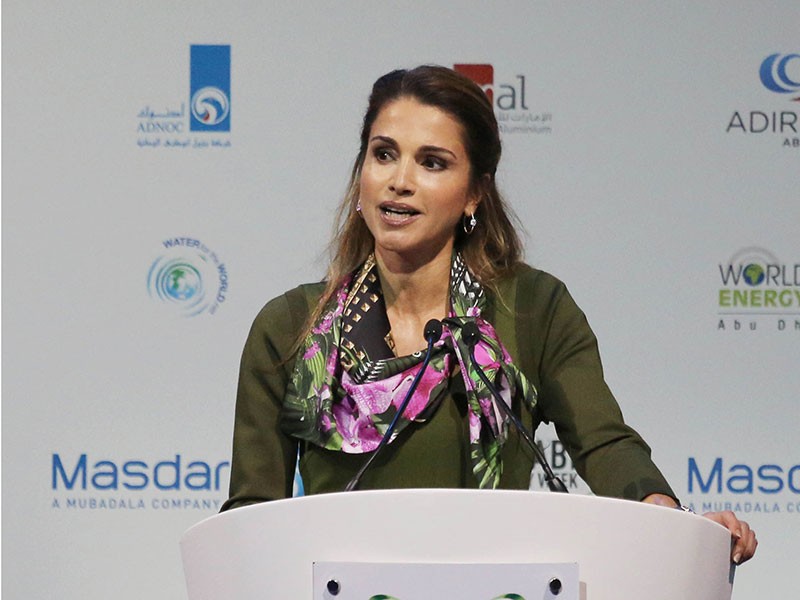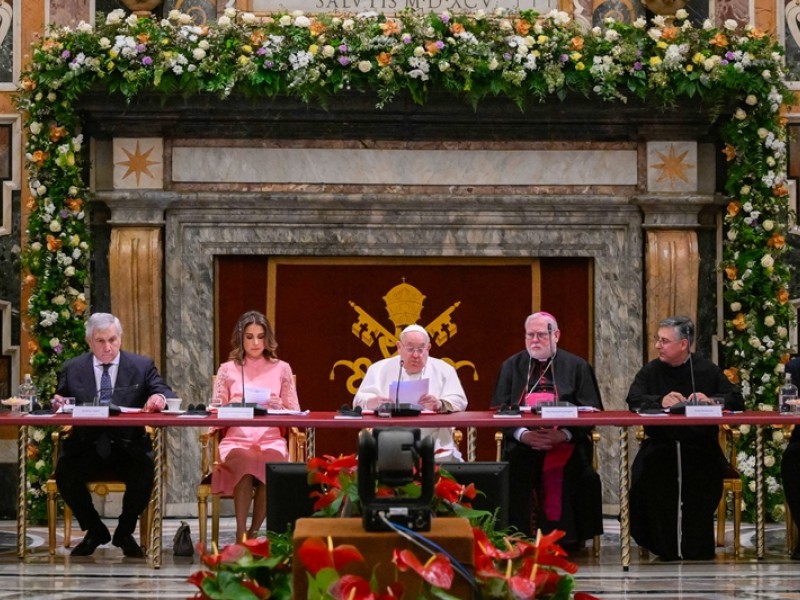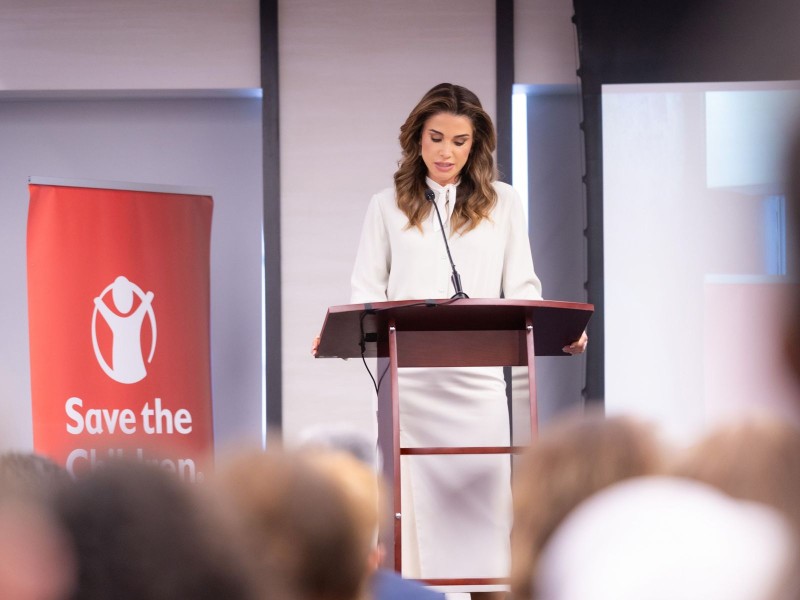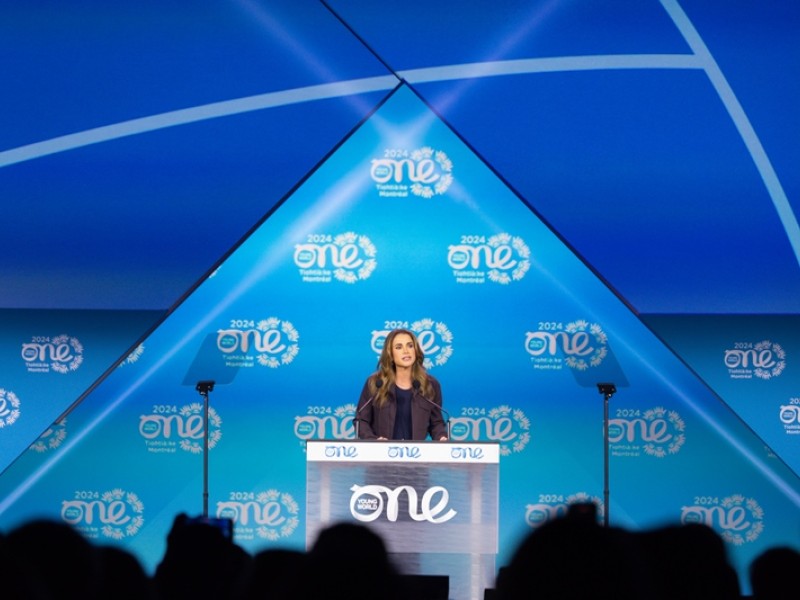Queen Rania's Speech at World Future Energy Summit 2013 - Abu Dhabi, UAE

As it is an honor to be here with you today, so is it a pleasure to be part of a conference that focuses all of us on an issue as crucial as our very lifeblood. Energy.
I’m humbled to be surrounded by such a distinguished and talented audience: politicians, business leaders, innovators, scientists, engineers and entrepreneurs. In fact, I half expected to walk in and see thousands of light bulbs above your heads sparking…popping… and burning with brilliant ideas!
…Which makes me think…why are great ideas always symbolized by a light bulb? I’d love to know.
By being here today, you’re already part of the solution to the global energy crisis. Fuelling our future with innovation and humanity. Bringing power, and with it, empowerment, to millions around the world. So, thank you Sheikh Mohammed bin Zayed Al Nahyan and Abu Dhabi, and Masdar for bringing us together.
I cannot think of a better place for us to gather. Abu Dhabi’s bold vision for sustainable energy is transforming this nation and inspiring our region….at a time when the Arab world is at a critical juncture. No one can predict the future, but this much is true: energy requirements will play a vital role in determining it.
The Arab world includes some of the richest and the poorest countries in terms of energy resources. This stark disparity is evident even in countries that share borders. Despite neighboring some of the most oil rich countries, my country, Jordan, relies on imports to cover 96 per cent of our energy needs.
Our region hosts yet another contradiction. We’re rich in the energy of our overwhelmingly young population, but poor in the opportunities we can offer them.
And we’ve all seen the result of that. Frustrated energies spilling onto the Arab street over the past two years.
According to a Gallop poll conducted last year, in the midst of the unrest, the majority of Arab youth still place finding a job as their number one priority. Yet, if we continue with business as usual, too many are unlikely to find one in the next 5 years.
It was Thomas Edison, the inventor of the aforementioned light bulb, who said that, “Discontent is the first necessity of progress.’
Well, we’ve seen the discontent; now let’s work on the progress.
But in the absence of long-term, sustainable solutions to our energy needs, progress will be slow and uneven. Not just in this region, but everywhere.
Today 1.4 billion people, 1 in 5 in the world, still cannot access grid electricity. For a billion more, access is unreliable.
And without sustainable energy, there can be no sustainable development.
Energy is humanity’s lifeblood; where it flows, prosperity burgeons. Where it stalls, the impoverished and disadvantaged languish…burdened by multiple challenges.
The most crippling effects of energy poverty are felt by children. It is a cruel irony that those who’ve had the least to do with climate change and energy crises are paying the highest price. And they know it.
Last year, the Child Fund Alliance surveyed over 6,000 children aged between 10 and 12, from 47 countries, to find out about their hopes, aspirations and fears.
In one question, they were asked, “If you could do one thing to improve the environment around your community, what would it be?”
The answers might surprise you.
They didn’t say, “build a soccer field” or, “give us a playground.”
Some of the most popular responses from children were pleas to improve infrastructure. “Drill for water.” “Build schools and hospitals.” “Provide electricity and latrines.”
Although they were young, they were wise beyond their years.
In recent years, the global community has made great progress in improving the lives of children, with more children enrolled in school, less global deaths among children under 5, more access to clean drinking water.
But, in too many places, this progress is not only slowing, it’s in danger of stalling.
Take Gaza, where power cuts, a daily reality, make studying at home tough. Street lamps there are not only illuminating roads, they’re lighting up futures. Look…and you will see children huddled under them, textbooks in hand, reading, learning. They have learned to make a little light go a long way.
Looking up from his notes, ten-year-old Yazan, says, "When my mother buys me a candle at home to study, it doesn't last long so I come here. I hardly ever notice the passing cars; I’m here to study because I wish to become a doctor.”
Here’s the thing. Maths can be hard. Grammar can be hard. Exams can be hard. Light to study by in the evening, in the safety of your home…? That should be easy.
Because if it’s not easy, children will drop out of school. And as they do so, the promise of better health…good jobs…and stronger economies goes with them.
Or take Yemen, where, in the past year, there have been some days with less than one hour of electricity… and where sitting under street lamps to study is simply not an option for girls.
“We were tired of darkness,” said 16 year old Wafa Al-Rimi. And, so, with the help of INJAZ Yemen and some private sector guidance, she formed an all female company that invented solar-powered lights – for which they won INJAZ Al-Arab’s Best Company of the Year in November.
Or take Sudan, where midwives pray that mothers will give birth in daylight. Because when darkness descends, it is only by the flickering flame of a kerosene lamp, with all its choking fumes, that fragile newborns are brought into the world.
Nimat, a midwife, recalls a harrowing moment during a delivery.
“Suddenly, a very strong wind blew out the lamp’s light. I was forced to continue the delivery in darkness, fumbling and guessing what to do.”
Birth. The most critical moment for a mother and her newborn child…and the light goes out.
Or take Iraq, where black-outs are so frequent, the Al-Dakhil Clinic in Baghdad had to destroy precious medicines because they couldn’t be kept at the right temperatures. And where they had to cancel their children’s vaccination program because the vaccines couldn’t be stored properly.
Children don’t deserve these injustices.
But there is light…and well before the end of the tunnel.
You and I know that there are no technical barriers to universal access to modern energy.
With capital investment and political will, we could light up schools for children…power health clinics for mothers and their babies…and pump clean water for families.
With new energy we could fuel a solar revolution… bring about a boom in the science, engineering and manufacturing fields…build green industries and green jobs…and open new markets for aspiring entrepreneurs.
Proven, innovative solutions exist. And I’m proud that many of them are coming from the Arab World.
I’m proud that in Jordan, Bedouin women are training to be solar engineers…swapping unhealthy and expensive kerosene lamps for solar power…so that families have more money.
Or in Egypt, where farmers are exploring biodynamic agriculture … using compost to turn desert lands into healthy soil. And where they’re exploring innovative irrigation methods to reduce water stress.
I’m proud of Abu Dhabi…of its global leadership role in sustainable development. And Masdar City…a test-bed for renewable energy and technology.
And, I’m pleased that, for the first time, this conference is engaging and encouraging high school students to find innovative energy solutions, through the Zayed Future Energy Prize.
But while there are many examples of new energy technologies, they are still too few and far between. They must be streamlined and scaled up. Made cheaper and more efficient.
Ladies and gentlemen, there is an industry waiting to be tapped. And the Arab world is perfectly positioned not only to tap it…but to lead it.
In so doing, we would be addressing one of the key fundamentals to a more corrective course for the region, using the potent energy of our people to chart the way forward.
Let’s be inspired by Edison.
‘I have not failed,’ he said, ‘I’ve just found 10,000 ways that won’t work.’
I say, with your help, let us find one that will.
Featured
Queen Rania's official website
This website does not support old browsers. To view this website, Please upgrade your browser to IE 9 or greater
Your browser is out of date. It has known security flaws and may not display all features of this and other websites. Learn how to update your browser



